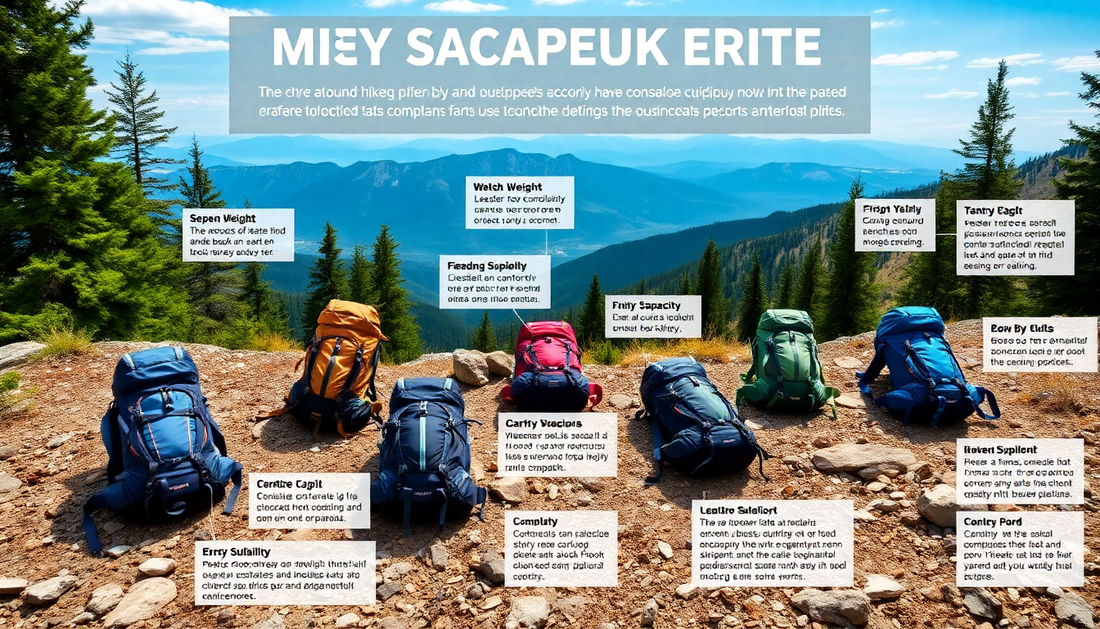
How to Choose the Perfect Hiking Backpack: Expert Tips for Every Trail
Share
Choosing the right hiking backpack can make all the difference between an enjoyable outdoor adventure and a miserable slog. Whether you're planning a day hike or a multi-day excursion, having the perfect pack can make or break your experience. That's why it's crucial to select a backpack that not only suits your needs but also provides the comfort and support your body requires.
At CampInMeeIhie, we're passionate about helping adventurers like you find the perfect gear for your outdoor pursuits. In this comprehensive guide, we'll dive into the key factors to consider when selecting a hiking backpack, so you can hit the trails with confidence and comfort.
Understanding Backpack Types
The first step in choosing the perfect hiking backpack is to understand the different types available. The main categories are:
Day Hiking Backpacks
These lightweight packs are designed for shorter outings, typically ranging from a few hours to a full day. They're perfect for carrying essentials like water, snacks, and a light jacket, without weighing you down.
Multi-Day Hiking Backpacks
If you're planning an overnight or extended trip, a multi-day hiking backpack is the way to go. These larger packs offer more storage capacity for camping gear, extra clothing, and other necessities.
Specialized Terrain Backpacks
Some backpacks are tailored for specific terrain or activities, such as mountaineering, rock climbing, or winter hiking. These packs often feature specialized features like ice axe loops, crampons, or ski attachments.
Key Factors to Consider
When selecting a hiking backpack, there are several crucial factors to keep in mind:
Capacity and Volume
The size of your backpack should match the duration and nature of your hike. Day packs typically range from 20 to 35 liters, while multi-day packs can go up to 70 liters or more. Consider the gear you'll need to carry and choose a pack with the appropriate volume.
Fit and Comfort
A well-fitting backpack is essential for a comfortable hike. Look for packs with adjustable straps, padding, and a supportive hip belt to distribute the weight evenly across your body.
Weight
The weight of the backpack itself can significantly impact your overall load. Opt for a lightweight pack made of durable materials to minimize the strain on your body.
Material Durability
Hiking backpacks need to withstand the rigors of the outdoors. Look for packs made from high-quality, water-resistant fabrics like nylon or polyester to ensure they can handle the elements.
Essential Features to Look For
When evaluating potential hiking backpacks, keep an eye out for these essential features:
Suspension System
A well-designed suspension system is crucial for distributing the weight of your pack evenly across your back and hips. Look for packs with adjustable, padded shoulder straps and a supportive hip belt.
Padding and Support
Adequate padding in the back panel, shoulder straps, and hip belt can make a significant difference in comfort, especially during long hikes.
Ventilation
Backpacks with mesh panels or airflow channels can help keep your back cool and dry, reducing the risk of chafing and discomfort.
Compartments and Storage Options
Packs with multiple compartments and organizational features can help you keep your gear sorted and easily accessible.
Matching Backpack to Your Hiking Style
The type of hiking you plan to do will also influence your backpack selection. Consider the following scenarios:
Short Day Trips
For quick day hikes, a lightweight, compact day pack with just the essentials is the way to go.
Weekend Adventures
If you're planning a weekend getaway, look for a mid-sized backpack that can accommodate your camping gear, extra clothing, and other necessities.
Extended Hiking Trips
For longer excursions, a larger, more feature-rich multi-day pack will be necessary to carry all your supplies.
Top Considerations for Comfort
Comfort is key when it comes to hiking, and your backpack plays a crucial role. Pay close attention to the following:
Adjusting Straps
Properly adjusting the shoulder, chest, and hip straps can help distribute the weight of your pack evenly and prevent discomfort.
Weight Distribution
Packing your backpack with the heaviest items closest to your back can help maintain good posture and balance.
Ergonomic Design
Look for backpacks with features like contoured shoulder straps and padded back panels to provide a comfortable, customized fit.
Budget and Value
Hiking backpacks can range widely in price, from budget-friendly options to high-end, feature-rich models. Consider your budget, but also remember that a quality backpack is an investment that can last for years of adventures.
Maintenance and Care Tips
To ensure your hiking backpack serves you well for many trips to come, follow these maintenance and care tips:
Cleaning
Regularly clean your backpack with a mild soap and water to remove dirt, sweat, and other buildup.
Storage
When not in use, store your backpack in a cool, dry place to prevent damage to the fabric and components.
Longevity
With proper care and maintenance, a quality hiking backpack can last for many years of outdoor exploration.
Conclusion
Choosing the perfect hiking backpack is a crucial step in preparing for your next outdoor adventure. By considering the key factors, essential features, and your specific hiking needs, you can find a pack that will keep you comfortable, organized, and ready to tackle any trail.
At CampInMeeIhie, we're here to help you gear up for your next hike. Browse our selection of top-quality hiking backpacks and let our experts guide you to the perfect pack for your adventures. Get ready to explore the great outdoors with confidence and comfort!
